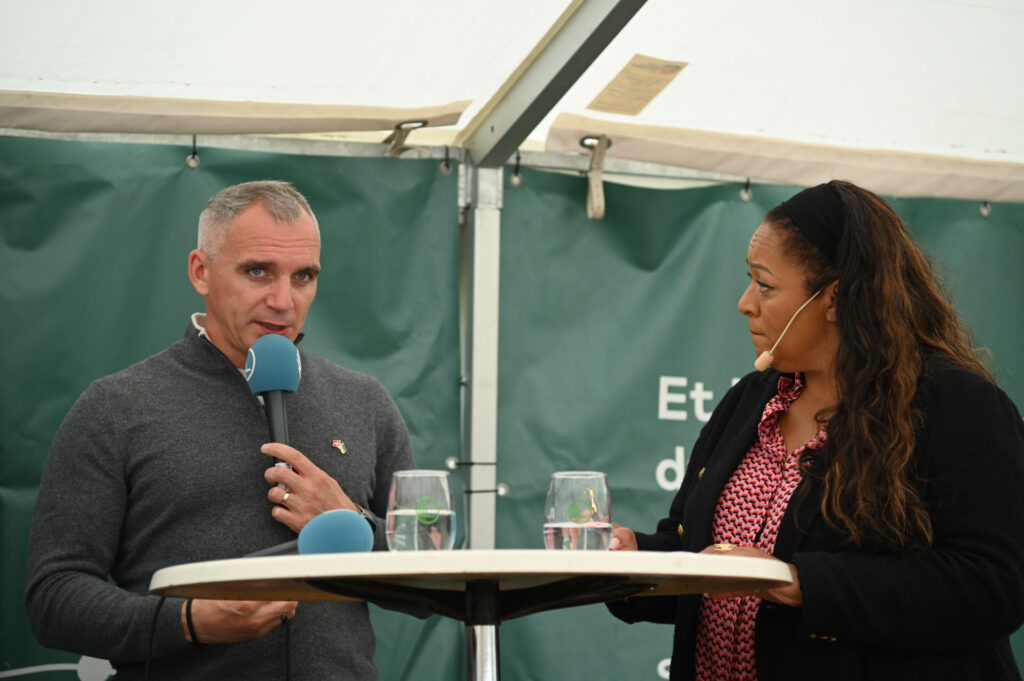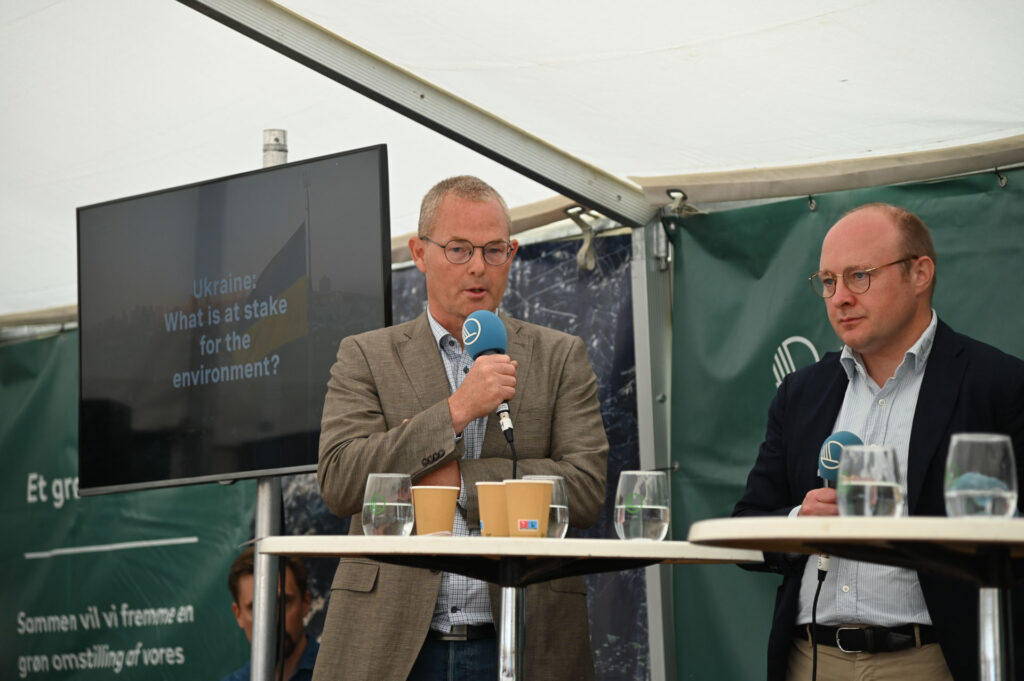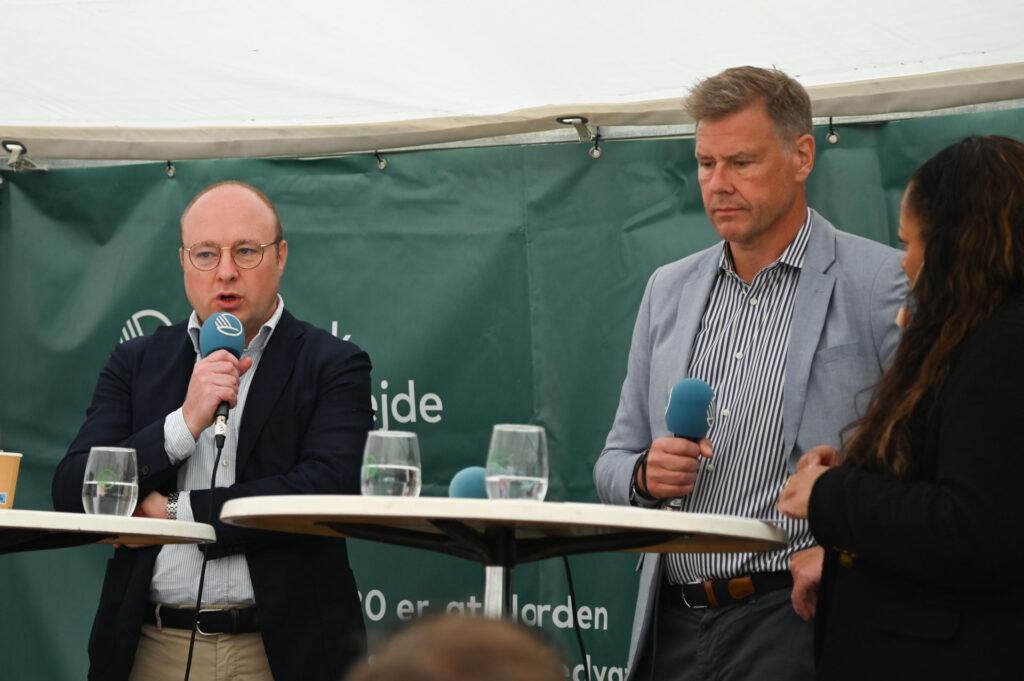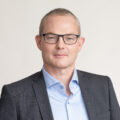26.06.2024 | Event
Nefco’s event at Folkemødet, co-organised with the Nordic Council and the Nordic Council of Ministers, spotlighted the importance of Danish investments in the Ukrainian utility sector, which Russian invasion forces have targeted. Rehabilitating the utilities sector is vital to improving the Ukrainian population’s living conditions and reducing negative environmental impacts in Ukraine as well as the Nordic countries.
At the Danish democracy festival, Folkemødet, Nefco had the honour of inviting the Mayor of Mykolaiv in Ukraine on stage to discuss the impact of Danish investments in the Ukrainian utility sector. The city has been deprived of clean drinking water for over two years. At Nefco’s event, co-organised by the Nordic Council and Nordic Council of Ministers, an expert panel discussed the rebuilding of Ukrainian infrastructure and the environmental stakes for Ukraine and the Nordic countries. The event, moderated by Vibeke Hartkorn, took place at the Nordic tent on 15 June 2024.
Severe damage to vital infrastructure
Due to the war, many large cities in Ukraine have seen continued interruptions to their electricity, heat and water supplifes. According to Mayor Oleksandr Sjenkevych, the Russian invasion forces have targeted significant infrastructure in several parts of the country, including water pipes and pumping stations, district heating and hydroelectric power plants. Apart from the devastating impact on the Ukrainian people and environment, this major setback to Ukraine’s green transition directly impacts the countries surrounding the Baltic Sea.

“There is a war in our country, and since April 2022, the City of Mykolaiv has been without clean drinking water,“ Sjenkevych said at the event. The Russian invasion forces initially destroyed the water distribution pipes that carried water from River Dnipro to the city. “When the occupation of Kherson ended, we were able to repair the pipes, but the Russians then destroyed the pumping stations on the left bank of the river. We then drilled boreholes around the city, pumped water to the surface and purified it. Now, people can collect plastic bottles with clean water to take home to their families.”
Strong support from Denmark
The Mayor was joined on stage by Bo Nyhus, Investment Director at Nefco; Søren Peter Andreasen, Deputy CEO of IFU, the Danish Investment Fund for Developing Countries; and Jørn Fredsgaard Sørensen, Head of Country and Bank Risk at EIFO, the Danish Export and Investment Fund. All three organisations are investing in efforts to rebuild infrastructure in the Ukrainian utility sector, including energy, the water supply and district heating.

With contributions from various governmental partners, Nefco has a financing programme of EUR 300 million for municipal projects in Ukraine, the Green Recovery Programme for Ukraine. One of these initiatives aims to improve the reliability, sustainability, and resilience of Mykolaiv’s water supply and reduce the amount of non-revenue water is wasted in the system. Another major issue is corrosion due to the use of salt water to compensate for the lack of water in the city. Through Nefco and Danida Sustainable Infrastructure Finance (DSIF), administered by IFU, Denmark has allocated up to EUR 5.36 million to reconstruct the water supply in selected areas of the city.
“40 per cent of the water in Mykolaiv is wasted,“ Nyhus explained. “There is a compelling need for investment in the Ukrainian utility sector. If we fail to support the green transition in Ukraine, it will negatively impact our environment and the region’s stability.” As an example of the environmental effect, Nyhus referred to Nefco’s involvement in improving wastewater treatment in Lviv, a city of 700,000 people in Western Ukraine. Without efficient treatment, the wastewater is discharged into rivers that run into the Baltic Sea, thus directly affecting the seas around Denmark.
A combination of state support and commercial activities
The panel represented different approaches to investing in Ukraine. Nefco’s interest lies in maximising the environmental impact, while IFU’s mandate is to consider environmental and societal development factors when investing.
“It’s incredibly important to hear the Mayor of Mykolaiv and the Ukrainian government emphasise long-term sustainable development,” said Søren Peter Andreasen, Deputy CEO of IFU, during the debate. He highlighted that Ukraine has ambitious plans for its energy sector to increase the share of green energy. “Today, the overwhelming majority of the Ukrainian energy supply stems from fossil fuels, which poses a threat to the environment and the stability of Ukrainian society. That is why IFU prioritises green energy and infrastructure investments, preferably using Danish knowledge and technology.”

Unlike IFU and Nefco, involvement from Danish businesses is a central requirement for all EIFO’s investments in Ukraine. EIFO started with an investment facility of EUR 134 million in Ukraine, later expanding it with an additional EUR 40 million. Furthermore, the Danish Government has provided a state guarantee of EUR 380 million to pave the way for Danish wind technology in Ukraine. According to Jørn Fredsgaard Sørensen of EIFO, the best way forward is to combine state support with commercial activities.
“EIFO’s mission is to promote Danish exports and present opportunities in Ukraine for Danish businesses. Our most significant contribution is to show that we can still conduct business with Ukraine. There’s no better way of demonstrating our support for the Ukrainian people, and it sends a very powerful message to Russia.”
Intensified efforts when the war comes to an end
The panel agreed there is a continued need for sizeable investments in Ukraine to enable the country to build back better and greener. All three organisations also highlighted the need for intensified investments in the country as soon as the war ends. An essential aspect of their work is to attract more private capital to Ukraine with their investments, which is difficult at the moment because of the uncertainty of the situation.
“The need for action and investments grows greater by the day,” said Nyhus. “We must come together to rebuild a greener and better Ukraine after the war. There is no question of that. The question is how we finance it.”
Mayor Sjenkevych emphasised that the continued collaboration between Denmark and Ukraine must build on both countries’ strengths. He says that the water and heating supply should remain the main focus of the collaboration, as these are areas where Denmark has significant expertise to share.
“However, we must also consider the future – when the war ends,” he added. “In the long term, we are not interested in having to rely on donations. We want to build strong partnerships with Danish businesses, especially in the energy sector, which represents great opportunities for both countries.”
Watch the event recording
For more information, please contact

